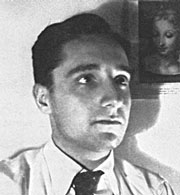
Born in Buenos Aires in 1923, Alfredo Hlito attended the Escuela Nacional de Bellas Artes. His first works showed a considerable influence of the Uruguayan Joaquín Torres García, though some years later he turned towards clearer forms and implemented a more abstract sense of composition. In 1945 he was a charter member of the Asociación Arte Concreto-Invención, and signed the Inventionist Manifesto in 1946.
His austere and personal style remained unchanged throughout great part of his work. During the concrete period (1945-1955) he wrote extensively on the problems of this type of abstraction, and those texts were compiled in 1995 by the Academia Nacional de Bellas Artes.
He took part, together with other members of the Asociación Arte Concreto-Invención in the Salon des Realités Nouvelles, Paris, as well as in the New Realities exhibition at the Van Riel gallery, Buenos Aires, both in 1948.
In 1951 he collaborated with Tomas Maldonado in the founding of Nueva Visión magazine. In 1954 he received the Acquisition Award from the II Biennial Exhibition of San Pablo, and the following year he participated in the XXVIII Biennial International Art Exhibition of Venice.
In 1964 he travelled to Mexico, where he lived until 1973.
He was a Number Member of the Academia Nacional de Bellas Artes as from 1984. In 1987 the Museo Nacional de Bellas Artes organized an important retrospective exhibition of his works, Alfredo Hlito. Obra pictórica 1945/1985 (Alfredo Hlito, Pictorial Work 1945/1985).
He also participated in important collective exhibitions, such as Vanguardias de la década de los 40. Arte Concreto-Invención. Arte Madí. Perceptismo at the Eduardo Sivori Museum (1980); Argentina, Concrete Art Invention 1945, Madí Group 1946 at the Rachel Adler Gallery, New York (1990); in the Art from Argentina 1920/1994 exhibition opened at Modern Art Oxford, 1994, a travelling exhibition that after visiting several European countries, was closed at the Centro Cultural Borges, Buenos Aires, in 1995.
He died in 1993.